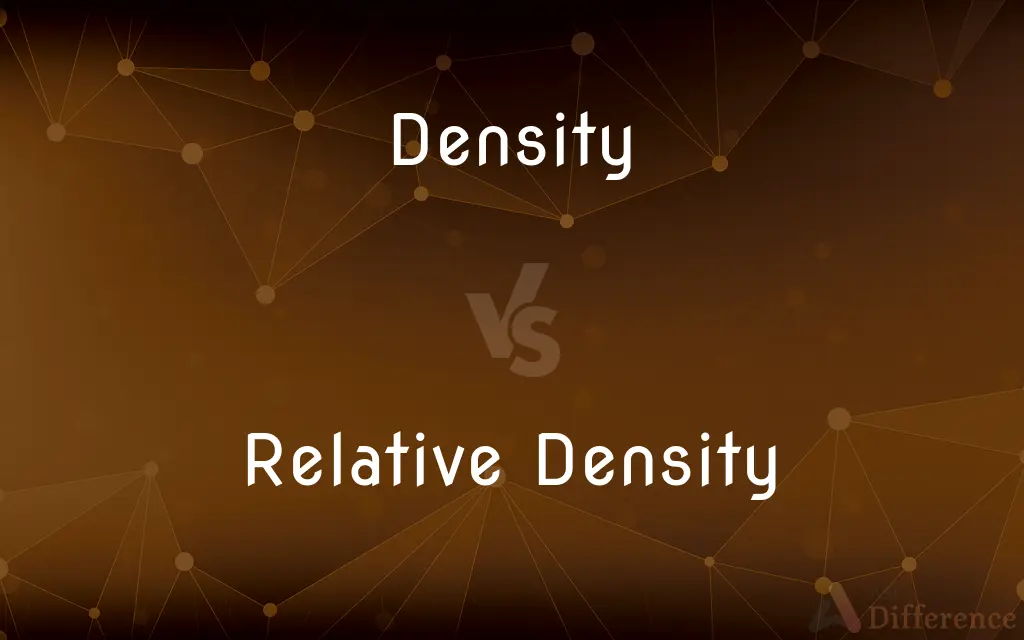Density vs. Relative Density — What's the Difference?
By Tayyaba Rehman — Published on November 22, 2023
Density is measure of mass per unit volume. Relative Density is ratio of the density of a substance to the density of a reference substance. Density is absolute; Relative Density is comparative.

Difference Between Density and Relative Density
Table of Contents
ADVERTISEMENT
Key Differences
Density represents how much mass is contained in a given volume. It is an absolute measure and is often described in terms such as kilograms per cubic meter or grams per cubic centimeter. Relative Density, on the other hand, is a dimensionless quantity as it represents the ratio of the density of one substance to that of another reference substance, usually water for liquids.
Understanding Density is crucial in various fields like engineering, chemistry, and physics. It can be utilized to determine the weight of an object or the buoyancy of an item in a fluid. Relative Density aids in quickly comparing the density of materials to a well-known substance, without the need to know the actual densities.
One key attribute of Density is that it doesn't require any reference to be understood; its value speaks for itself. However, the concept of Relative Density emerges from the need to compare densities. When one speaks of Relative Density, they are inherently making a comparison, usually to a standard like water.
In practical applications, if the Density of a substance is known, it remains constant irrespective of the sample's size. But, if one wishes to know how dense a substance is in comparison to another, particularly a standard, then Relative Density becomes the tool of choice.
Materials with a Relative Density greater than 1 are denser than the reference material, while those with a Relative Density less than 1 are less dense. With Density, however, the value directly communicates the compactness of matter within the material.
ADVERTISEMENT
Comparison Chart
Definition
Mass per unit volume.
Ratio of substance's density to a reference substance.
Units
Kg/m³, g/cm³, etc.
Dimensionless (e.g., 0.9, 1.2).
Reference Required
No reference needed.
Reference substance required.
Application
Used in determining weight, buoyancy.
Used to compare densities.
Nature
Absolute measure.
Comparative measure.
Compare with Definitions
Density
Measurement of mass per volume.
The Density of water is approximately 1 g/cm³.
Relative Density
Tells if a substance will float or sink.
A Relative Density greater than 1 indicates it will sink in water.
Density
Used to determine buoyancy in fluids.
Objects with greater Density than water sink.
Relative Density
Dimensionless quantity.
A Relative Density of 2 means it's twice as dense as the reference.
Density
Can vary with temperature and pressure.
The Density of air decreases at higher altitudes.
Relative Density
Aids in material selection.
By knowing the Relative Density, chemists can choose solvents for separations.
Density
The quality or condition of being dense.
Relative Density
Commonly compared to water for liquids.
Olive oil has a Relative Density less than 1 when compared to water.
Density
The quantity of something per unit measure, especially per unit length, area, or volume.
Relative Density
Comparison of substance's density to a reference.
The Relative Density of mercury to water is about 13.5.
Density
The mass per unit volume of a substance under specified conditions of pressure and temperature.
Density
(Computers) A measure of the number of bits that can be stored in a given amount of physical space on a storage medium.
Density
The number of individuals, such as inhabitants or housing units, per unit of area.
Density
The degree of optical opacity of a medium or material, as of a photographic negative.
Density
Thickness of consistency; impenetrability.
Density
Complexity of structure or content.
Density
Stupidity; dullness.
Density
(physics) A measure of the mass of matter contained by a unit volume.
Density
The ratio of one quantity, representing something of interest, to another quantity representing space, area, or extent in which the thing of interest is distributed.
The number of particles per unit volume of a specified volume can be considered to be the particle density for the specified volume.
Density
The probability that an outcome will fall into a given range, per unit of that range; the relative likelihood of possible values of a continuous random variable.
Density
Stupidity; denseness.
Density
The quality of being dense, close, or thick; compactness; - opposed to rarity.
Density
The ratio of mass, or quantity of matter, to bulk or volume, esp. as compared with the mass and volume of a portion of some substance used as a standard.
Density
Depth of shade.
Density
The amount per unit size
Density
The spatial property of being crowded together
Density
Indicator of compactness in a material.
Lead has a high Density, making it heavy for its size.
Density
Essential property in physics and engineering.
Engineers consider material Density when designing structures.
Common Curiosities
If an object has a Relative Density less than 1, will it float in water?
Yes, if its Relative Density is less than 1, it will generally float in water.
What is Density in simple terms?
Density is the amount of mass in a specific volume.
How is Relative Density different from Density?
Relative Density compares a substance's density to that of a reference, while Density is the mass per unit volume.
Is Density always constant for a material?
While a material's Density is generally consistent, it can change with conditions like temperature and pressure.
How can I determine the Density of an object?
You can determine Density by dividing the object's mass by its volume.
What's the usual reference for Relative Density in liquids?
For liquids, water is often the reference for Relative Density.
Can Relative Density be used for gases?
Yes, Relative Density can compare the density of a gas to a reference gas, often air.
If a liquid's Relative Density is greater than 1, will it sink in water?
Yes, a liquid with a Relative Density greater than 1 will sink in water.
Which has a higher Density: gold or aluminum?
Gold has a higher Density than aluminum.
Is Relative Density the same as specific gravity?
Yes, Relative Density is often synonymous with specific gravity.
Can Density change with temperature?
Yes, Density can vary with temperature, especially in fluids.
Why is Relative Density dimensionless?
Relative Density is a ratio of two densities, so units cancel out, making it dimensionless.
How is Density affected by pressure?
Generally, increasing pressure increases Density, especially in gases.
Why is understanding Relative Density important in chemistry?
It helps chemists in separations, understanding solubility, and predicting how substances interact.
Can the Density of an object determine if it floats in oil?
It's the object's Relative Density to oil that determines if it'll float or sink.
Share Your Discovery

Previous Comparison
Multiple vs. Diverse
Next Comparison
Evergreen Forest vs. Deciduous ForestAuthor Spotlight
Written by
Tayyaba RehmanTayyaba Rehman is a distinguished writer, currently serving as a primary contributor to askdifference.com. As a researcher in semantics and etymology, Tayyaba's passion for the complexity of languages and their distinctions has found a perfect home on the platform. Tayyaba delves into the intricacies of language, distinguishing between commonly confused words and phrases, thereby providing clarity for readers worldwide.












































